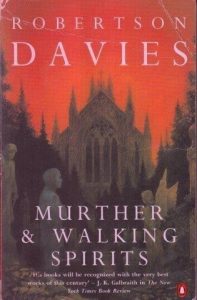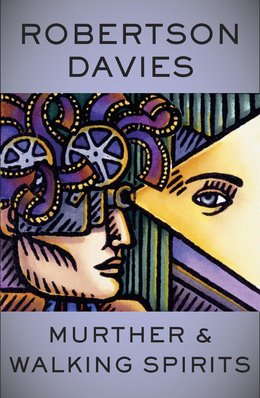Murther & Walking Spirits – Robertson Davies – 1991
Reviewed by: Dave Cymbalisty Date: 14 November 2001
An interesting book, I really enjoyed it. Who else but R. Davies could kill off his main character in the first sentence, and then chronicle the experiences of the disembodied ghost for over three and a half hundred pages… and yet keep it increasingly interesting? He does it. Incidentally, Davies believed that physical death would not spell the annihilation of the animating spirit of man (a belief to which I am in full agreement). He once speculated about his own afterlife by saying: “I haven’t any notion of what I might be or whether I’ll be capable of recognizing what I’ve been, or perhaps even what I am, but I expect that I shall be something.” Murther is a really interesting fictional account of what that “something” might be like.
 The moment that Connor Gilmartin is struck dead in his own bedroom by his wife’s lover, he finds that he is still alive! Perhaps even more alive than he has ever been… he is in a state that the opening chapter calls “roughly translated”. He’s a ghost; a walking spirit. This new state is fraught with all manner of possibilities and limitations. For one thing, his powers of awareness and observation are heightened, but he is unable to communicate with any of the living, no matter how he jumps up and down or shouts in their ear. And for that typically Robertsonian twist, the great author borrows an idea from the Bhagavad Gita which states that after death one maintains a connection with what one was thinking about at the moment of death. (It behoved a man to be concerned with what he was thinking of as he died)! So… what was Connor Gilmartin thinking of at that moment? Well, he was processing the fact that he had just caught his wife involved with a man (a co-worker) whom he particularly despised for many reasons, and secondly, he was thinking of a particular work-related problem concerning an upcoming Film Festival in Toronto to which this man (his murderer) was vying with him for position as lead writer. Now Connor is dead, aware of his wife’s duplicity in covering up the murder but unable to vindicate himself in any way, and furthermore he is bound inextricably to his own murderer who attends the Film Festval as lead writer in his place. In a surreal twist, at the Film Festival, what Connor views on the screen is not what the others are seeing, but rather it is a documentary of his own ancestry… (one’s life flashes before one’s eyes??) He is seeing something wholly personal. After the festival he is instantly translated back to see how his wife is winding up her affairs… he sees that she has actually found a way to profit from his untimely demise. This story was great right to the end… with the disclaimer that in my opinion it is important to remember it as a fanciful rather than a literal view of what happens after your last breath. He raises a lot of interesting things to think about though. Not the best example of Davies’ work, but still worthy of four and a half stars to my favorite Canadian writer.
The moment that Connor Gilmartin is struck dead in his own bedroom by his wife’s lover, he finds that he is still alive! Perhaps even more alive than he has ever been… he is in a state that the opening chapter calls “roughly translated”. He’s a ghost; a walking spirit. This new state is fraught with all manner of possibilities and limitations. For one thing, his powers of awareness and observation are heightened, but he is unable to communicate with any of the living, no matter how he jumps up and down or shouts in their ear. And for that typically Robertsonian twist, the great author borrows an idea from the Bhagavad Gita which states that after death one maintains a connection with what one was thinking about at the moment of death. (It behoved a man to be concerned with what he was thinking of as he died)! So… what was Connor Gilmartin thinking of at that moment? Well, he was processing the fact that he had just caught his wife involved with a man (a co-worker) whom he particularly despised for many reasons, and secondly, he was thinking of a particular work-related problem concerning an upcoming Film Festival in Toronto to which this man (his murderer) was vying with him for position as lead writer. Now Connor is dead, aware of his wife’s duplicity in covering up the murder but unable to vindicate himself in any way, and furthermore he is bound inextricably to his own murderer who attends the Film Festval as lead writer in his place. In a surreal twist, at the Film Festival, what Connor views on the screen is not what the others are seeing, but rather it is a documentary of his own ancestry… (one’s life flashes before one’s eyes??) He is seeing something wholly personal. After the festival he is instantly translated back to see how his wife is winding up her affairs… he sees that she has actually found a way to profit from his untimely demise. This story was great right to the end… with the disclaimer that in my opinion it is important to remember it as a fanciful rather than a literal view of what happens after your last breath. He raises a lot of interesting things to think about though. Not the best example of Davies’ work, but still worthy of four and a half stars to my favorite Canadian writer.















